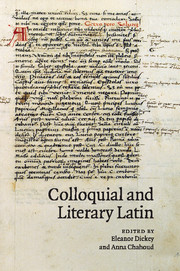Book contents
- Frontmatter
- Contents
- List of contributors
- Acknowledgements
- Foreword (David Langslow)
- PART I THEORETICAL FRAMEWORK
- PART II EARLY LATIN
- PART III CLASSICAL LATIN
- PART IV EARLY PRINCIPATE
- 17 Petronius' linguistic resources
- 18 Parenthetical remarks in the Silvae
- 19 Colloquial Latin in Martial's epigrams
- 20 Current and ancient colloquial in Gellius
- 21 Forerunners of Romance -mente adverbs in Latin prose and poetry
- PART V LATE LATIN
- Abbreviations
- References
- Subject index
- Index verborum
- Index locorum
20 - Current and ancient colloquial in Gellius
Published online by Cambridge University Press: 04 April 2011
- Frontmatter
- Contents
- List of contributors
- Acknowledgements
- Foreword (David Langslow)
- PART I THEORETICAL FRAMEWORK
- PART II EARLY LATIN
- PART III CLASSICAL LATIN
- PART IV EARLY PRINCIPATE
- 17 Petronius' linguistic resources
- 18 Parenthetical remarks in the Silvae
- 19 Colloquial Latin in Martial's epigrams
- 20 Current and ancient colloquial in Gellius
- 21 Forerunners of Romance -mente adverbs in Latin prose and poetry
- PART V LATE LATIN
- Abbreviations
- References
- Subject index
- Index verborum
- Index locorum
Summary
Aulus Gellius' theoretical attitude to current spoken usage is clear-cut (Wolanin 1999): it is a degenerate aberration from the pure Latin spoken before Augustan times (13.6.4), corrupted by the ignorant (15.5.1) and to be rejected even when not confined to the common herd (1.22.2). In this judgement there is no ambiguity; it remains only to see how far theory is supported by practice.
However unwilling Gellius may be to speak like the masses of his own day, he has no objection to speaking like the masses of long ago. In Noctes Atticae 17.8 the philosopher L. Calvenus Taurus, having invited his students in Athens to dinner, sends for oil to pour into the pot of Egyptian lentils and diced gourd on which the feast is based; a pert slave-boy accidentally brings an empty jar and, amidst much shaking and grimacing, claims perquam Attice that the oil is frozen: §7 μὴ γελᾶτε, inquit, ἔνι τοὔλαιον· ἀλλ᾽ οὐκ ἴστε οἵα φρίκη περὶ τὸν ὄρθρον γέγονε τήμερον; κεκρυστάλλωται. Taurus laughingly bids him in Latin to run and fetch some: §8 Verbero, inquit ridens Taurus, nonne is curriculo atque oleum petis?
That the exchange is of Gellius' own concoction is clear enough from the confusion between φρίκη and frigus (Holford-Strevens 2003: 232); we need therefore not worry about the kind of Latin Taurus used, or whether on such an occasion he would have spoken Latin at all. It is far more important to notice the echoes of early drama, in particular comedy.
- Type
- Chapter
- Information
- Colloquial and Literary Latin , pp. 331 - 338Publisher: Cambridge University PressPrint publication year: 2010
- 1
- Cited by



